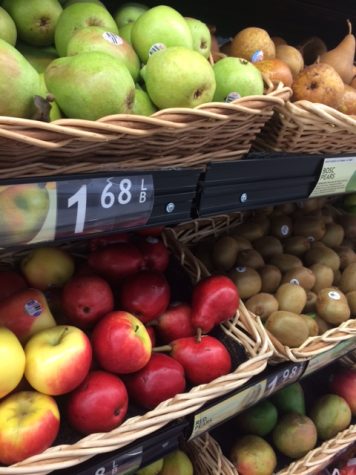The Truth Behind Veganism
November 9, 2016
When people first hear the word vegan, most think of “crazy vegetarians” or “extreme dieters”. However, it’s proven that veganism is much more complex than just that.

Veganism is a type of lifestyle that does not consume meat, meat by-products, or animal by-products such as eggs or dairy. Vegans only eat products of the plant kingdom and believe in nonviolence towards animals and the Earth. According to The Vegetarian Resource Group’s website (VRG), a normal diet of a vegan consists of foods like vegetables, fruits, oatmeal, nuts, seeds, grains, and more. Even though they live off a restrictive diet, they still manage to get their daily amounts of food to be considered healthy, as well as other natural vitamins. Not only do vegans watch over their daily food intake but they also exclude from wearing animal products such as leather, wool, fur, and silk. This is to further the idea that animal violence is not okay.
A few Hershey High School students have tried going vegan. One of those students is HHS sophomore Anna Levin. During the months of June and July of this year, Levin attempted to change her diet. According to Levin, one of the reasons behind this was to make both her life and her family’s life easier.
“It was easy to make vegan dishes that everyone in my family could enjoy,” said Levin.
Not only did Levin and her family start eating vegan dishes but Levin also stopped eating meat completely.
Although meat is typically consumed for the protein it gives, there are other healthier foods that are full of protein. Some of those include lentils, chickpeas, tofu, peanut butter, whole wheat bread, soy milk, kale, and many more.
”I stopped eating meat products because it was wrong. I don’t like how animals are treated, and I want no part in it,” said Levin.
Levin has listened to many of the talks and articles regarding veganism, and all of them revolve around the same main idea: the meat industry is unethical. Levin wanted to see first-hand what a diet without meat products is like, so she tried it. She was very satisfied with the results. She lost a lot of weight, had better skin complexion, and felt more energized.
Levin is not the only one satisfied with not consuming meat products. Anjali Sareen, a blogger for The Huffington Post, also recalls sleeping better at night, feeling more energized, and having better skin complexion.
”The first was that seemingly overnight, my skin turned from an acne-prone mess into beautiful, clear, and healthy-looking skin,” said Sareen.
Another health benefit of veganism is that it reduces the risks of major chronic diseases such as heart disease and cancer. This is due to the fact that vegan diets are free of cholesterol and are generally low in saturated fat. Vegans also tend to get more calcium in their diet due to the amount of dark green vegetables they consume. This results in stronger bones, according the The Vegetarian Resource Group(VRG).
Although the vegan diet is very healthy, there are some disadvantages. Vegans are more vulnerable to nutritional deficiencies dealing with Iron, Zinc, Vitamin D, and the vitamin B12. Since the vegan diet does not contain Vitamin D, deficiencies can take place. However, there is still a way to receive Vitamin D: sunlight. According to VRG, if people spend ten to fifteen minutes about two to three times a week out in the sunlight, then they will still receive the recommended amount of Vitamin D. Nutritional deficiencies are some of the only recorded setbacks a vegan diet may encounter.
Go find out today if a vegan diet is good or bad for yourself.


